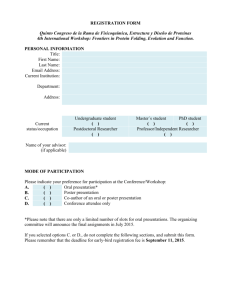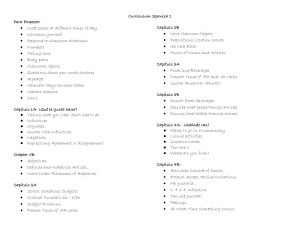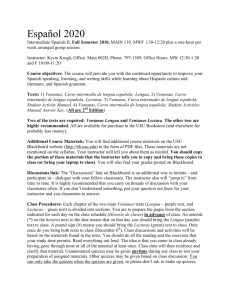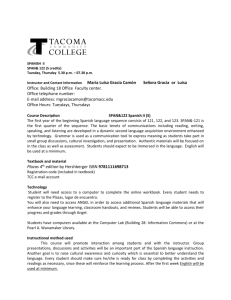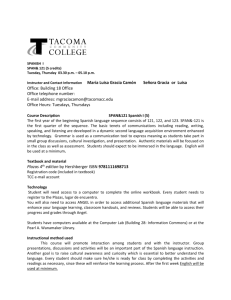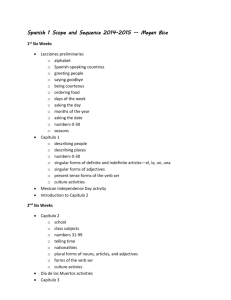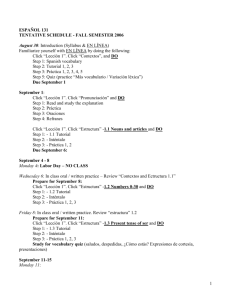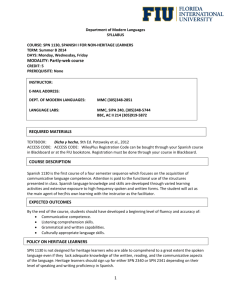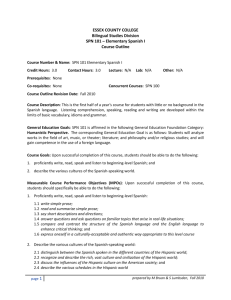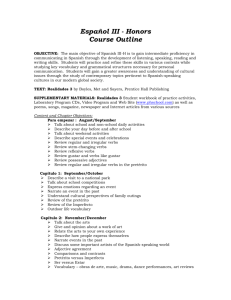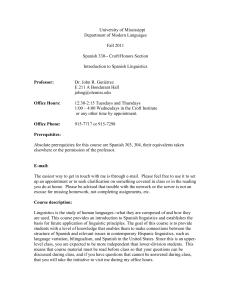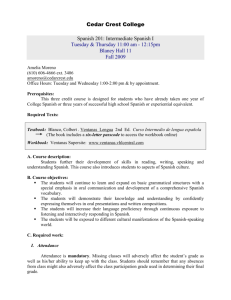SPAN 2010 Intermediate Spanish I - Pellissippi State Community
advertisement
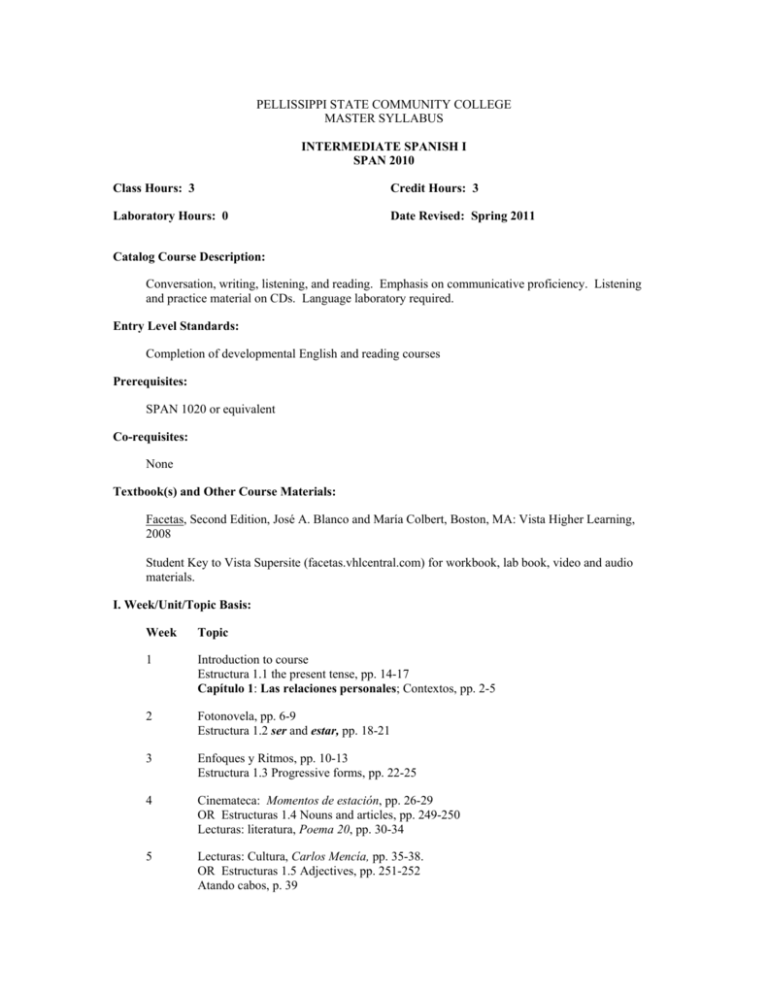
PELLISSIPPI STATE COMMUNITY COLLEGE MASTER SYLLABUS INTERMEDIATE SPANISH I SPAN 2010 Class Hours: 3 Credit Hours: 3 Laboratory Hours: 0 Date Revised: Spring 2011 Catalog Course Description: Conversation, writing, listening, and reading. Emphasis on communicative proficiency. Listening and practice material on CDs. Language laboratory required. Entry Level Standards: Completion of developmental English and reading courses Prerequisites: SPAN 1020 or equivalent Co-requisites: None Textbook(s) and Other Course Materials: Facetas, Second Edition, José A. Blanco and María Colbert, Boston, MA: Vista Higher Learning, 2008 Student Key to Vista Supersite (facetas.vhlcentral.com) for workbook, lab book, video and audio materials. I. Week/Unit/Topic Basis: Week Topic 1 Introduction to course Estructura 1.1 the present tense, pp. 14-17 Capítulo 1: Las relaciones personales; Contextos, pp. 2-5 2 Fotonovela, pp. 6-9 Estructura 1.2 ser and estar, pp. 18-21 3 Enfoques y Ritmos, pp. 10-13 Estructura 1.3 Progressive forms, pp. 22-25 4 Cinemateca: Momentos de estación, pp. 26-29 OR Estructuras 1.4 Nouns and articles, pp. 249-250 Lecturas: literatura, Poema 20, pp. 30-34 5 Lecturas: Cultura, Carlos Mencía, pp. 35-38. OR Estructuras 1.5 Adjectives, pp. 251-252 Atando cabos, p. 39 Examen I: Capítulo 1 6 Capítulo 2: Las diversiones, Contextos, pp. 42-45 Estructura 2.1 Object Pronouns, pp. 54-57 Fotonovela, pp. 46-49 7 Estructura 2.2 gustar and similar verbs, pp. 58-61 Enfoques y ritmos, pp. 50-53. 8 Estructura 2.3 Reflexive Verbs, pp. 62-65 Cinemateca: Espítitu deportivo, pp. 66-69 9 Lecturas: Literatura, Idilio, pp. 71-74 OR Estructuras 2.4 Demonstratives, pp.256-257 OR Estructuras 2.5 Possessives, pp. 258-259 Lecturas: Cultura, El toreo, pp. 75-78 10 Atando Cabos, p. 79 Examen II: Capítulo 2 Capítulo 3: La vida diaria, Contextos, pp. 82-85 11 Fotonovela, pp. 86-89 Estructura 3.1 The preterite, pp. 94-97 12 Estructura 3.2 The imperfect, pp. 98-101 Enfoques y ritmos, pp. 90-93 Estructura 3.3 Preterite vs. Imperfect, pp. 102-105 13 Cinemateca: Adiós Mamá, pp. 106-109 OR Estructura 3.4 Telling time, pp. 263-264 Lecturas: Literatura, Pedro Salvadores, pp. 111-115 14 Lecturas: Cultura, El arte de la vida diaria, pp.116-118 Atando cabos, p. 119 Examen III: Capítulo 3 15 Examenes finales II. Course Goals*: The course will A. Build listening comprehension: I.1 B. Develop speaking skills I.4, I.5 C. Improve reading comprehension I.6 D. Expand understanding of cultural sensitivity III.2, IV.3, IV.5 E. Develop writing skills I.3, I.5 *Roman numerals after course goals reference TBRs General Education Goals http://www.pstcc.edu/departments/curriculum_and_instruction/syllabi/general-ed-outcomes.h tml III. Expected Student Learning Outcomes*: Students will be able to: 1. Comprehend increasingly difficult oral conversation in Spanish, and respond appropriately. A, B 2. Comprehend and discuss short movies and documentaries in Spanish. A, B 3. Pronounce correctly all vocabulary. B 4. Carry on conversations on a variety of topics using a variety of verb tenses. B 5. Be understood by a native speaker not used to dealing with foreigners. B 6. Understand the main ideas in magazines and newspapers. C 7. Exhibit respect of the cultural and linguistic differences of various Hispanic groups. E 8. Have good control of basic composition forms. D 9. Write simple letters of correspondence, fill out forms, write messages and notes well enough to meet practical, social demands. D 10. Understand the cultures of many Spanish and Latin American countries as they differ from the student's culture. E 11. Recognize and appreciate some of the contributions of the people of Spain and Latin America in art, literature, and music. E 12. Read, comprehend and discuss short stories and poetry. B, C * Capital letters after Expected Student Learning Outcomes reference the course goals listed above. IV. Evaluation: A. Testing Procedures: 75% of grade Quizzes . . . . . . . . . 25% 3 exams . . . . . . . . . 50% B. Laboratory Expectations: 15% of grade Online workbook, lab book, video and audio materials from Vista Supersite (facetas.vhlcentral.com) C. Field Work: When feasible, some assignments may require attendance at a performance or special program in Spanish or about Spain or Latin America. D. Other Evaluation Methods: 10% of grade Class attendance, preparation and participation E. Grading Scale: 90-100 87-89 80-86 77-79 70-76 60-69 59 - 0 A B+ B C+ C D F V. Policies: A. Attendance Policy: Pellissippi State expects students to attend all scheduled instructional activities. As a minimum, students in all courses (excluding distance learning courses) must be present for at least 75 percent of their scheduled class and laboratory meetings in order to receive credit for the course. Individual departments/programs/disciplines, with the approval of the vice president of the Learning Division, may have requirements that are more stringent. In very specific circumstances, an appeal of the policy may be addressed to the head of the department in which the course was taken. If further action is warranted, the appeal may be addressed to the vice president of Academic Affairs. Attendance is critical since if a student is not in class, s/he can not participate and will lose participation grade for the day. Additionally, the final grade will be lowered one step on the grading scale for each hour missed after six (6). B. Academic Dishonesty: Academic misconduct committed either directly or indirectly by an individual or group is subject to disciplinary action. Prohibited activities include but are not limited to the following practices: • Cheating, including but not limited to unauthorized assistance from material, people, or devices when taking a test, quiz, or examination; writing papers or reports; solving problems; or completing academic assignments. • Plagiarism, including but not limited to paraphrasing, summarizing, or directly quoting published or unpublished work of another person, including online or computerized services, without proper documentation of the original source. • Purchasing or otherwise obtaining prewritten essays, research papers, or materials prepared by another person or agency that sells term papers or other academic materials to be presented as one’s own work. • Taking an exam for another student. • Providing others with information and/or answers regarding exams, quizzes, homework or other classroom assignments unless explicitly authorized by the instructor. • Any of the above occurring within the Web or distance learning environment. C. Accommodations for disabilities: Students who need accommodations because of a disability, have emergency medical information to share, or need special arrangements in case the building must be evacuated should inform the instructor immediately, privately after class or in her or his office. Students must present a current accommodation plan from a staff member in Services for Students with Disabilities (SSWD) in order to receive accommodations in this course. Services for Students with Disabilities may be contacted by going to Goins 127, 132, 134, 135, 131 or by phone: 539-7153 or TTY 694-6429. More information is available at http://www.pstcc.edu/sswd/. D. Other Policies: Quizzes and Exams Quizzes and chapter exams will be used to assess student proficiency of material covered in the chapter. Be aware, no make-up quizzes or exams will be given. At the end of the course, one quiz will be dropped before the final grades are calculated. If a student misses any chapter exam for any reason s/he will be required to take a comprehensive final exam. The final exam is optional for all students who have taken the 3 chapter exams. However, any student may take the final comprehensive exam. If the score is higher than one of the 3 Chapter Exam scores, it will replace that score. Homework Graded homework consists of work assigned in the Facetas Supersite online workbook and lab manual and any other work assigned by the instructor to be turned in for a grade. Preparation and Participation Spanish will be used in the classroom to the greatest extent possible and students are expected to be prepared each day to do the assigned material in Spanish. Special Accomodations “If you need accommodations because of a disability, if you have emergency medical information to share, or if you need special arrangements in case the building must be evacuated, please inform me immediately. Please see me privately after class or in my office. Students must present a current accommodation plan from a staff member in Services for Students with Disabilities in order to receive accommodations in this course. Services for Students with Disabilities may be contacted by going to Goins 125, 127 or 131, or Alexander 105 or by phone 694-6751 (Voice/TDY), 539-7091 or 539-7249.”
